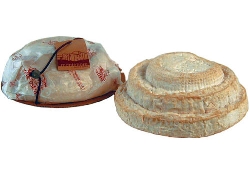Montébore cheese

Region: Piemonte
Milk: Mixed
Definition: Fresh or mature cheese.
Raw material: Mixed cows' milk (75%) and ewes' milk, rennet, salt.
Characteristics: Characteristic conic shapes known as ‘castellini' (small castles) formed by stacking 3-5 cheese layers of different diameters and weight, one on top of the other. Total weight is 500-1500 g, with a base measuring 15-20 cm and height of 12-14 cm. The rind is thin and pale yellow, rubbery in the fresh cheese and coarse with surface mould as it matures. The cheese is soft and ivory in colour, with no fissures, and it acquires a firmer texture as it matures.
Production area: Montebore (Frazione di Dernice) in the Comunità Montana delle Valli Curone g.u. Ossona. Neighbouring municipalities of the high valley of the same name; Val Borbera and Valle Spinti.
History: Montébore is a small town in Val Curone, on the divide between the g.u. and Borbera valleys. At the end of the 15th century a wealthy Tortonese (citizen of Tortona)gave 50 cheeses to a high priest in an attempt to advance his brother's career in the priesthood. At the end of 15th century, it was the only cheese that featured on the menu of the lavish wedding of Isabella of Aragon, daughter of Alfonso, and Gian Galeazzo Sforza, son of the Duke of Milan. The strange ‘wedding cake’ form was inspired by the town’s ancient tower.
Production technique: The raw milk is mixed in a vat and heated to about 30°C. Once rennet has been added, the milk coagulates in 60 minutes. The curds are broken into nut-sized granules with a wooden curd knife. After being left to stand for 20 minutes, the curds are drained and placed in “ferslin" (wooden cylindrical moulds) and turned after a few minutes; this is repeated about 4 – 5 times within the space of half an hour. The curds are then allowed to stand for about 10 hours in a cool, dry room. They are then removed from the moulds, the top and sides are salted and they are left to stand for about 4 – 5 hours in sloping wooden containers. The cheese is subsequently washed in lightly salted tepid water and the ‘castellini' are prepared by stacking 3-5 forms of decreasing size, one on top of the other. Further washing can be carried out depending on the duration of the maturation period.
Materials used
- wooden moulds (Ferslin)
- wooden utensils
- draining cloths
- wooden maturing boards (cherry-wood or black hornbeam wood)
Reference: Alpinet Gheep
Calories in different varieties and various types of cheeses
The number of calories in various types of cheese is very similar when you compare your cheese to a similar types of cheese.
For example, almost cheeses that are similar to Cheddar cheese have around 400 calories per 100g
If the Montébore cheese is not listed below, select a similar type of cheese from the list below to get a rough idea for the number of calories in Montébore cheese.
The calorie lists are sortable by clicking the up and down arrows in the heading columns
| Cheese type | Calories per 100g |
|---|---|
| American cheese | 371 |
| Blue cheese | 353 |
| Camembert cheese | 299 |
| Cheddar cheese | 402 |
| Cottage cheese | 98 |
| Edam cheese | 357 |
| Farmer's cheese | 98 |
| Feta cheese | 264 |
| Fontina cheese | 389 |
| Goat cheese | 364 |
| Gouda cheese | 356 |
| Gruyere cheese | 413 |
| Mozzarella cheese | 280 |
| Parmesan cheese | 431 |
| Pimento cheese | 375 |
| Provolone cheese | 352 |
| Queso blanco cheese | 310 |
| Ricotta cheese | 174 |
| Roquefort cheese | 369 |
| Swiss cheese | 380 |
Discover Cookipedia's Culinary Creations on Pinterest
Explore the vibrant world of Cookipedia through our Pinterest page! We've curated a stunning collection of recipes that highlight the beauty of home-cooked dishes. It's the perfect way to visually navigate our extensive recipe library and get inspired by the flavours we’ve shared over the years. Dive in and discover your next favorite meal—one picture at a time!
Errors and omissions
If you are a cheese producer and your cheese does not appear to be listed on Cookipedia or the information on your cheese is incorrect or out of date, please use the Contact the Editor page to send us a message and we will update the information on your cheese.